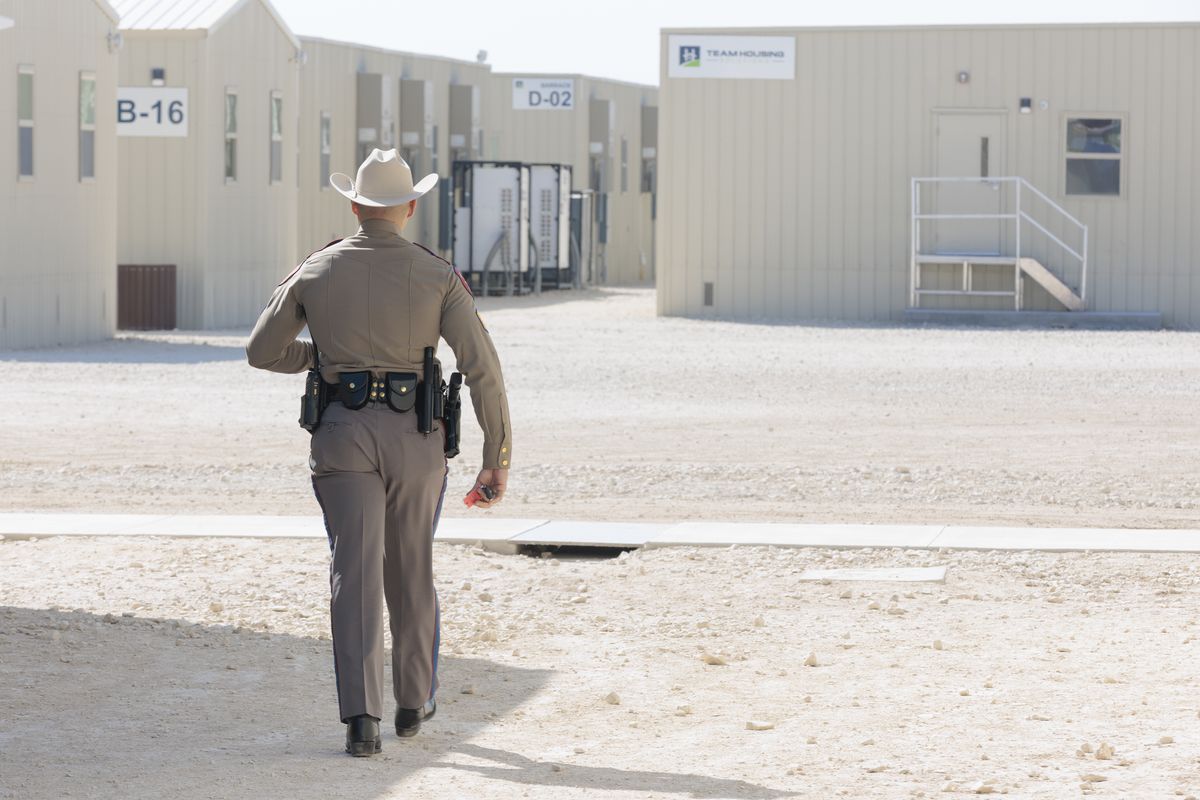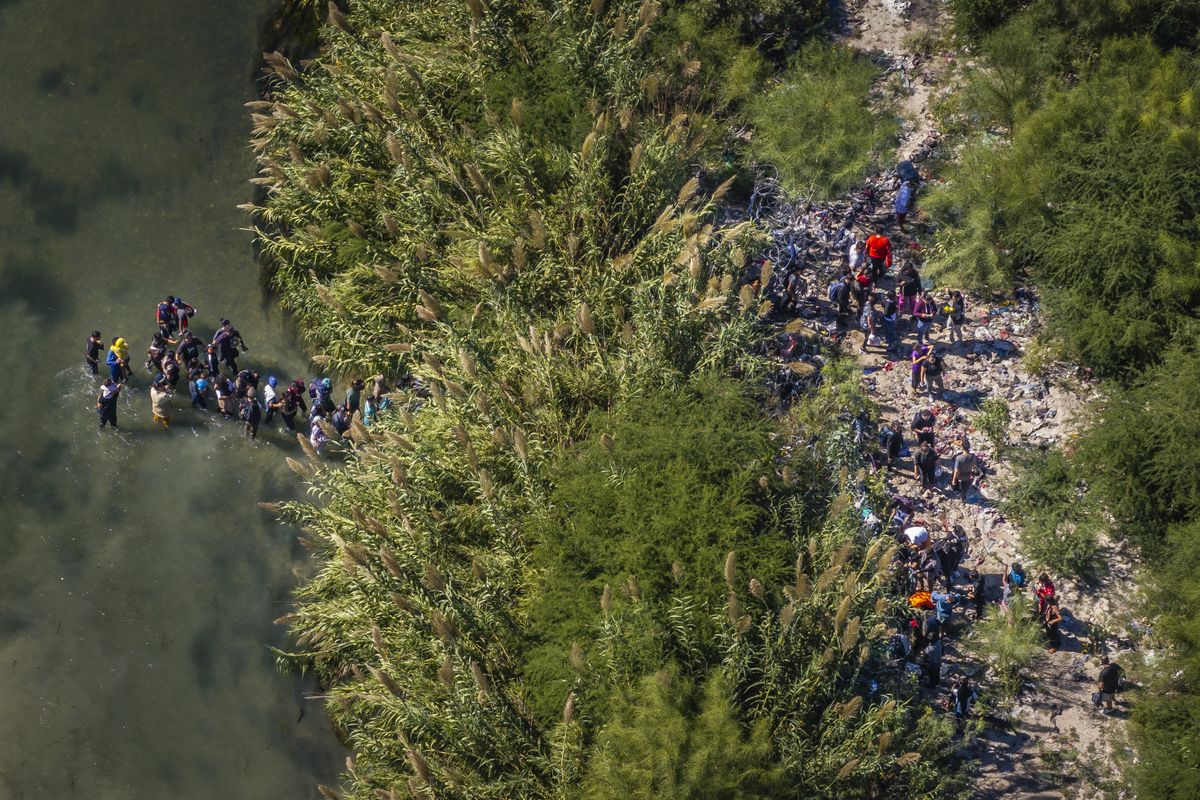Texas is gearing up in a big way for Trump’s mass deportation campaign
At Eagle Pass, Texas, migrants cross the Rio Grande from Mexico to the United States in late September. (Jabin Botsford/Washington Post)
EAGLE PASS, Texas – While Donald Trump’s opponents denounce the president-elect’s planned “mass deportations” and border crackdown, this state’s Republican leaders are vying to make Texas the launching pad.
Gov. Greg Abbott and other top officials have spent the past four years positioning themselves as the Biden administration’s greatest antagonists – and heirs to the border enforcement campaign begun by the last Trump administration. Despite having no constitutional authority on immigration enforcement, they have used tools of the state to dramatically escalate anti-immigrant policy and legislation locally while steering a similar narrative nationally.
Among their moves: pumping $11 billion into Abbott’s Operation Lone Star border enforcement, busing migrants to distant states and targeting organizations that advocate for them. All marked a clear departure from the “compassionate conservatism” of a Texas GOP that once granted in-state tuition to undocumented students and resettled thousands of refugees.
And Trump’s imminent return to the White House gives the state powerful leverage.
“The leadership of Texas is trying to create a model for the federal government that is exceptionally tough and exceptionally cruel to immigrants,” said Daniel Hatoum, senior supervising attorney for the Texas Civil Rights Project. “Texas is more than willing to let the Trump administration co-opt its institutions for immigration enforcement.”
That was the core of Abbott’s message during a joint appearance Tuesday with Trump’s incoming “border czar,” Tom Homan, an event held at a state military base on the border in Eagle Pass. The small city about 145 miles southwest of San Antonio became the front line last year in the governor’s battle with the federal government over the “invasion,” as he called it, by record numbers of migrants.
“There is a change afoot as we speak right now,” the governor told scores of Texas National Guard troops and law enforcement assembled for a Thanksgiving meal. State officials are already conferring with Trump’s transition deputies about border security, he noted – on “actions, planning, preparation, schematics.”
Since the Nov. 5 election, state leaders have suggested they could reduce funding for border security, especially if the federal government takes over. On Tuesday, however, Abbott and Homan talked about working together to ramp up, not scale back.
Once Trump takes office, Abbott said, “we’re going to be doing more and faster than anything that’s ever been done to regain control of our border, restore order in our communities and also identify, locate and deport criminals in the United States of America who have come across the border.”
Homan, Trump’s former acting director of Immigration and Customs Enforcement, praised Operation Lone Star and its “unprecedented success in Texas.” The state’s approach, he said, is one that could be replicated as the next administration pursues mass deportations. “This is a model we can take across the country.”
Whether that administration will start reimbursing Texas wasn’t addressed. Abbott has requested $2.88 billion more for special border operations when the legislature reconvenes in January. Homan acknowledged the hefty price tag.
“It’s a shame the taxpayers of Texas had to spend billions of dollars to do the job (the Biden administration) failed to do,” he said.
To the east in the Rio Grande Valley, Texas Land Commissioner Dawn Buckingham was making a separate overture Tuesday, standing in front of a stretch of the 51 miles of border wall that Texas has built without any federal assistance.
She announced the creation of “the Jocelyn Initiative,” named after a 12-year-old Houston girl killed earlier this year, allegedly by men from Venezuela who crossed the border illegally. The initiative, Buckingham said, would offer more than 1,400 acres of state-owned land to accelerate the deportation of “criminal illegal immigrants.”
“I will do everything in my power to help this administration,” she said. “Should you need land for a facility elsewhere in the state for the deportation of violent criminals, my office has identified several of our properties and is standing by, ready to make this happen on day one of his presidency.”
Indeed, Texas has ample land, detention space and resources to house and process immigrants. Yet its robust state economy relies heavily on undocumented labor, especially in the booming construction, agriculture and service industries. Abbott and other top Republicans here have not addressed the hit those could take. (Only California, a blue state inclined to fight the next Trump administration, has more undocumented immigrants.)
Mark Krikorian, executive director of the conservative Center for Immigration Studies, expects Texas to be the epicenter of the federal action and threatened mass deportations for several reasons.
“It’s not just recent border crossers. It’s people who have come in the past four years, and a lot of them are in Texas,” he said. Logistics will be a consideration, too. For Mexican and South American migrants rounded up elsewhere in the country, “South Texas is closer to where you’re sending people back to.”
Then there’s the political factor. Texas is the sole border state with a Republican governor and Republicans controlling the legislature and every major state office. When it comes to ensuring Trump’s enforcement efforts are not blocked locally, “having a cooperative state can matter,” Krikorian noted.
During past border buildups, seen in the family separations of the last Trump administration or family detentions under President Barack Obama, federal officials in Texas were able to quickly erect massive facilities for temporarily holding and processing people. They encountered little resistance.
“It’s a lot easier to unlock and dust off facilities that are already there,” Krikorian said.
In 2021, frustrated by what he considered President Joe Biden’s failure to secure the border, Abbott declared the situation a disaster. That allowed him to circumvent environmental and other state rules while loosening state purse strings to launch Operation Lone Star.
The undertaking blanketed the border with Texas National Guard troopers, law enforcement, concertina wire and other barriers. It also paid to bus nearly 120,000 asylum seekers and migrants from border communities like Eagle Pass and Del Rio to major Democratic-led cities, which struggled to meet the newcomers’ needs.
Texas created its own criminal justice apparatus for migrants charged under state laws, erected processing centers, cleared space to detain thousands of people in three state prisons – 232 were being held this week – and then prosecuted and deported them. The American Civil Liberties Union of Texas asked the Justice Department to investigate and sued last year on behalf of several migrants they alleged had been illegally held in prolonged detention.
“Operation Lone Star has been a civil rights disaster,” Cody Wofsy, deputy director of the ACLU Immigrants’ Rights Project, said Monday. “It’s basically a workaround to set up their own border system.”
Meanwhile, Texas Attorney General Ken Paxton repeatedly sued to block Biden’s immigration policies. Paxton, a Trump ally, also sought to criminalize and strip the nonprofit status of immigrant advocacy organizations all along the state’s more than 1,200-mile border, even as an increasingly hard-line legislature passed measures empowering local law enforcement to arrest, detain and, with a court order, help deport anyone suspected of being in the country illegally.
Earlier this year, Abbott issued an executive order directing public hospitals to question patients about their immigration status, plus track and report the cost of treating those in the country illegally. The next legislative session is set to consider measures that would direct law enforcement to fingerprint undocumented children and track them in a database, potentially restricting their access to public schools despite long-standing legal precedent.
“We’ve been trying to raise a red flag here for years in Texas about what’s been happening,” said state Rep. Victoria Neave Criado, a Dallas Democrat who has chaired the Mexican American Legislative Caucus. “Militarizing the border, fearmongering and creating chaos in these communities doesn’t make Texas safer.”
Nowhere has the force of the border crackdown been felt more than in Eagle Pass, where state forces built their base and took over the city’s prized riverfront park. Texas officials restricted federal access to the Rio Grande, lining the riverbanks with razor wire and barrier buoys. When federal agents cut the wire, the state fought them in court. On Wednesday, the U.S. Court of Appeals for the 5th Circuit limited the Biden administration’s authority to destroy the wire but also required Texas to grant agents access to the park.
Taxpayer dollars have gone to contractors who built the state base, Camp Eagle, and soldiers continue to patrol despite a precipitous decline in crossings following the Biden administration’s moves to restrict asylum and Mexico’s stepped-up enforcement.
State Rep. Eddie Morales, a moderate Democrat representing the area, initially supported Operation Lone Star but now worries that the governor is taking it too far, funneling money to favored contractors without sufficient checks and balances.
“We can’t spend our way to a solution,” Morales said.
Residents have watched the state tighten its grip here.
“Our park was the heart of Eagle Pass, and they took it away from us,” said Amerika Garcia Grewal. “We didn’t have any choice in the matter. They said it was ‘for our protection’ and tried to brainwash the community.”
Garcia Grewal, who holds a monthly vigil for migrants who die crossing the border, said Texas officials have figured out how to monetize pain by using her community as their laboratory.
“The cruelty is the point,” she said, “and they are making money off of it.”


